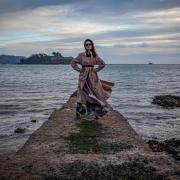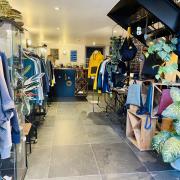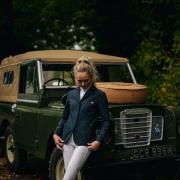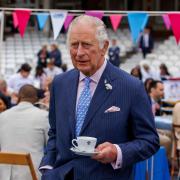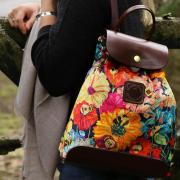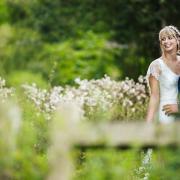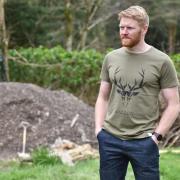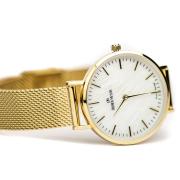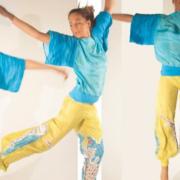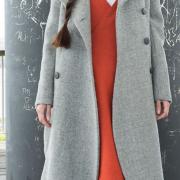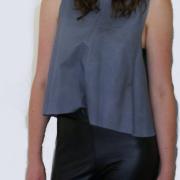Issues surrounding fast and sustainable fashion are tackled head on in a new exhibition in Haldon Forest, writes Alexandra Richards
The 21st-century is a time of ‘fast fashion’. Gone are the days of needle and thread, of darning socks and repairing love-worn items of clothing. Nowadays, it is faster, more convenient (and often cheaper) to replace an item than go to a tailor or tend to the holes yourself. I, too, am guilty of rushing into shops an hour before I need to be somewhere, and grabbing a �6 bargain to fulfil my needs for one evening. I rarely think of the consequences or indeed the reasons why we can buy such inexpensive items of clothing.
This year, CCANW (Centre for Contemporary Art and the Natural World) in Haldon Forest is trying to make us do just that; to start thinking about ‘fast fashion’ and its implications and perhaps change our attitude towards sustainable fashion.
It’s time to dig out your needle and thread. ‘Slow’ fashion is back in vogue
‘Sustainable fashion’ appears to be an oxymoron when considering today’s largely consumerist mentality. The words conjure up images of starchy fabric, drab colours and shapeless garments. Few high street retail chains stock organic lines due to the lack of interest they initiate. Therefore, I was pleasantly surprised to hear about or, more to the point, see the clothes being exhibited with CCANW this summer.
Fashion Footprints: Sustainable Approaches’, part of an extended exhibition entitled ‘Fashion, Textiles and the Environment’, the exhibition has been curated and researched by students and graduates from the MA Fashion and the Environment course at London College of Fashion. The garments in this exhibition were produced by some of the UK’s brightest young sustainable designers and the outfits are wearable and exciting – not a hint of hessian in sight! The textures and patterns created with sustainable fabrics are innovative and attractive, with a beautiful and elegant draped silver ‘eco-jersey’ dress to a ripstop windshell made from 100% recycled polyester, there is something to interest all tastes.
‘Fashion Footprints’ is not purely showcasing innovative design, there is a serious undertone to the exhibition, to raise awareness of ‘slow’ fashion and to get people thinking about their consumer habits. The four-month Fashion Footprints project explores the major challenges within fashion and offers realistic solutions. The concept of sustainable fashion is a production process that meets the needs of the present without compromising the needs of future generations, while maintaining social, environmental and economic balance. Sharn Sandor, one of the graduate researchers and curators of the exhibition, explained that we should view sustainable or ‘organic’ fashion in the same context as organic food and local produce.
We should view sustainable or ‘organic’ fashion in the same context as organic food and local produce
Living in the South West, with the abundance of delicious local produce on offer, this was an analogy I could relate to. Organic fashion has the same characteristics as those of the increasingly omnipresent organic food movement - where a product is created and produced with consideration to the environment and social impact it will have throughout its existence. This involves issues from the carbon footprint of a product to its quality and durability. The widely publicised problems with non-organic food are very similar to those encountered in ‘fast’ fashion. For example, a mass-produced cotton t-shirt will be treated with such harmful chemicals that those working to create these clothes (often children) can die from the toxic effects of these pesticides and chemicals. This is just one of the stages within the production process that sustainable fashion is hoping to eradicate.
A mass-produced cotton t-shirt will be treated with such harmful chemicals that those working in their manufacture (often children) can die from the toxic effects
The exhibition has been divided into eight sections, each explaining the design process from the cotton fields to the shops. The sections are accompanied by a garment to represent different aspects of sustainable fashion, from a pioneering ‘closed-loop production’ piece to a ‘hand-me-down’ cherished garment.
All the clothes featured in the exhibition will be included in a fashion ‘look book’ available from November through CCANW. This look book will include all of the fashion from the exhibition and it will act as a go-to manual for sustainable design.
The exhibition has certainly changed my outlook on a subject I had rarely considered beforehand. The beautiful garments present sustainable fashion in a contemporary, accessible context, helping to highlight the theory that if small changes can be made – even simple considerations such as the brand of detergent you use – then everyone can assist in the move towards a more sustainable fashion industry. Although it may be hard to resist the lure of a high street bargain, it’s time to dig out your needle and thread. ‘Slow’ fashion is back in vogue.
‘Fashion Footprints: Sustainable Approaches’ runs from 1 August to 21 November. For more information visit http://www.ccanw.co.uk or call 01392 832277
Note: The clothes featured in this fashion shoot will not be in the exhibition at CCANW but will be within the look book, featuring all garments involved in the exhibition, available from November
Fashion Footprints Events
September – November 2010The exhibition will include several workshops, seminars and other activities throughout its residence at CCANW. Please visit www.ccanw.co.uk or call 01392 832277 for more dates, prices and information.
Friday 24 SeptemberForum: Wool Culture 210am-4pm. Admission �19 (�15 conc). Booking essential, includes refreshments and lunch.Town Hall, Bovey Tracey
Saturday 16 OctoberSeminar: Material Actions10am-3.30pm. Admission free. Booking essential.Studio Theatre, Plymouth College of Art, exhibitions@plymouthart.ac.uk
Friday 22 OctoberWorkshop: Dinner to Dye for10am-5pm, dinner at 6pm. Admission �30 (�25 conc) including meal. Booking essential (numbers limited.)
Friday 22 OctoberFilm: Documentaries to Dye for7.30pm. Admission �5 (�3 conc). Booking essential.
Tuesday 26 OctoberHalf-term Workshop: Felting Accessories12.30pm-3pm. Admission �4. No booking required.
Thursday 4 NovemberConference: Ethical Fashion Insights10.30am-4pm. Admission �24 (including lunch); �10 conc (does not include lunch). Numbers limited. Book through CCANW.Somerset College of Arts and Technology, info@ccanw.co.uk



